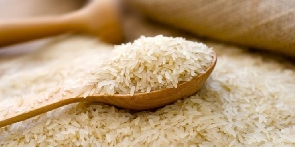 File photo showing locally produced rice
File photo showing locally produced rice
The Osudoku Agriculture Co-operative Society, a group made up primarily of rice farmers in Asutuare, has appealed to the government for urgent intervention to help boost rice production and sustain livelihoods in the area.
The farmers say they face numerous challenges that continue to limit their productivity and competitiveness, including inadequate access to funding, the lack of warehouses, and insufficient farming equipment such as harvesters and dryers.
According to them, these constraints make it difficult to operate efficiently, forcing them to depend on private individuals who rent out such facilities at exorbitant rates.
Former President of the Co-operative, Mr Sampson Tettey Ekpa, said the Asutuare rice farmers have the capacity to meet a significant portion of Ghana’s rice demand if given the right level of government and private sector support.
“With adequate funding, equipment, and market access, we can produce enough to drastically reduce Ghana’s dependence on imported rice,” he said.
Mr Ekpa further noted that rice production in Asutuare has great potential to create jobs and strengthen local economies if the right investments are made in infrastructure and value chain development.
The Secretary of the Co-operative, Mr Simon Adzah, also expressed concern about the lack of a ready market for their produce.
He explained that many farmers are compelled to rely on market women for financial assistance during production, a situation that often results in exploitative pricing.
“Because some market women fund our farming activities, they dictate the prices when it’s time to sell the rice.
This leaves farmers with little to no profit,” he lamented. “We believe that with government intervention and access to fair markets, these challenges can be addressed.”
Women working on the rice fields shared similar concerns, calling on government agencies, development partners, and agribusiness investors to support local rice production initiatives in the Asutuare enclave.
They stressed that timely support in the form of input subsidies, mechanisation, and market linkages would not only boost production but also improve their livelihoods and contribute to national food security.
The Asutuare rice belt remains one of Ghana’s key rice-producing zones, but farmers say without sustained investment and government backing, the country’s goal of achieving rice self-sufficiency will remain difficult to attain.
